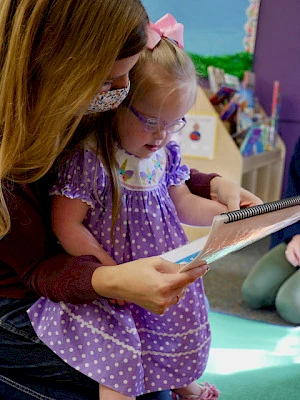Unlocking Potential Through Therapy
Q&A with ACCESS Speech-Language Pathologist Molly Ramsey
Therapy is the heart of what we do at ACCESS and the foundation upon which our mission was founded 27 years ago. Our team of therapists are more than just experts. They go above and beyond everyday to help each client unlock potential within themselves. We caught up with Molly Ramsey, ACCESS Speech-Language Pathologist and Early Childhood Speech Therapy Team Leader, to learn more about what drives success for our therapy programs.

What are some of the most common reasons children may need speech therapy during early childhood? How do those needs change as children get older and approach school-age? The most common areas of need we treat at the Early Childhood campus are delays in receptive language, expressive language, social interaction/play skills and articulation. We also work with children who are hearing impaired, have dysfluencies in their speech, or experience difficulties with feeding. Early intervention services may be short-term or long-term, but it is critical that services involve the family, and not just the child. Speech therapy for young children includes providing information, teaching strategies, and lots of feedback to families. Sometimes children need short-term services to help them “catch up” on skill acquisition, but other children may need long-term services. As children move into school, speech therapy still targets language and articulation disorders, but it becomes more focused on academic and/or functional life skills.
What makes therapy at ACCESS unique? We have such a talented, creative, and dedicated group of speech, occupational, and physical therapists at ACCESS. Our therapists are compassionate and form wonderful relationships with their clients and their families. They are also insightful and able to recognize the needs of each individual child. Many of our therapists continue their education/training in their specific areas of interest which allows us to have individual experts in various treatment areas on our teams. That niche training and specialization has even led to the creation and expansion of ACCESS’s feeding therapy program!
The ACCESS team approach creates an environment where therapists and educators collaborate for their clients both in and outside of the classroom. How does that affect the way your approach therapy with a client? The team approach at ACCESS allows teachers and therapists a better opportunity to treat the whole child. When collaborating as a team, we each bring to the table our area of expertise while collectively pursuing common overall goals for the child’s success and independence.

As a therapist, how do you define success for your clients? Success for my clients certainly looks different for each child. Progress may involve improved comprehension skills, an increased vocabulary, speech that is more easily understood by others, improved independence with overall communication, or more successful social interactions with their peers.
What advice would you give to parents who feel like their child may be showing some delays in language or other developmental delays? You should speak with your child’s doctor or request an evaluation if you feel your child may be delayed in an area. It is important to ask questions and seek information from professionals. Sometimes concerning behaviors may turn out to be developmentally age-appropriate. If early intervention is deemed necessary, it is best to begin therapy services as soon as possible.